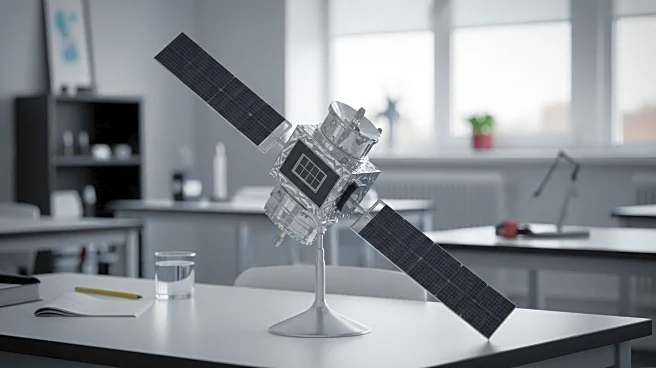What's Happening?
A girls' school in Croydon, South London, is set to become the first all-girls school globally to launch a satellite into space. The independent Croydon High School has designed and constructed a satellite, aiming to send it into low-Earth orbit within the next few years. This initiative, named Mission Pegasus, seeks to inspire female students to engage in STEM subjects, where women are currently underrepresented. The school's Stargazers Club previously launched two high-altitude weather balloons in 2023, reaching the edge of space. The satellite, designed by students, is intended to measure atmospheric wavelengths to assess air quality and contribute to climate science. The project is led by Arabi Karteepan, the head of physics, in collaboration with the University of Bath.
Why It's Important?
This initiative is significant as it addresses the gender imbalance in STEM fields, particularly in space science. By providing hands-on experience in satellite construction and launch, the project aims to empower young women to pursue careers in science, technology, engineering, and mathematics. The representation of girls in such roles can inspire future generations, demonstrating that they can achieve what might seem impossible. The project also contributes to climate science, offering practical applications for the students' work. This could lead to increased interest and participation in STEM subjects among female students, potentially influencing educational and career choices.
What's Next?
The next steps involve preparing the satellite for launch into low-Earth orbit, which is expected to occur in the coming years. The school will continue to work with the University of Bath to ensure the satellite's successful deployment and operation. As the project progresses, it may attract attention from educational and scientific communities, potentially leading to further collaborations or funding opportunities. The success of Mission Pegasus could serve as a model for other schools to encourage female participation in STEM fields.
Beyond the Headlines
The project highlights broader societal issues, such as gender equality in education and the workforce. By challenging stereotypes and providing role models, the initiative could contribute to cultural shifts in perceptions of women's capabilities in science and technology. Additionally, the satellite's focus on climate science underscores the importance of environmental education and awareness, potentially influencing students' future contributions to sustainability efforts.










